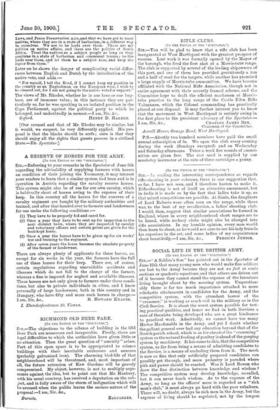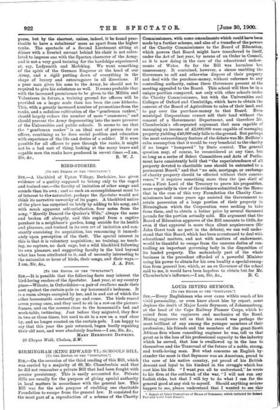SOCIAL LIFE IN THE BRITISH ARMY. [To VIE EDITOR OF
TIIE "SPECTATOR:1 Sra,—" A Soldier's Son" has pointed out in the Spectator of June 16th that many young men who would make fine soldiers are lost to the Army because they are not au fait at conic sections or quadratic equations; and that others are driven out of it because they cannot stand the expense of the luxurious living brought about by the messing system. Unquestion- ably there is far too much importance attached to mere scholastic attainments in candidates for the Army, and the competitive system, with the attendant horror of the "crammer," is working as much evil in the military as in the Civil Service. It is about the worst system possible for test- ing practical qualities, and hence we find in both Services a race of theorists being developed who are a great hindrance to practical work. Admittedly, we cannot have too many Hector Macdonalds in the Army, and yet I doubt whether the gallant general ever had any education beyond that of the Scotch parish school, which is as far ahead of the "cramming" system as the natural feeding of poultry is ahead of the gorging system by machinery. It has come to this, that the competitive system, so far from being a means of admitting candidates to the Service, is a means of excluding them from it. The mesh is now so fine that only artificially prepared candidates can possibly get through, and mere pedantry is paraded where pith and power should be exacted. Was it Lord Bowen who drew the fine distinction between knowledge and wisdom The competitive system may develop knowledge, so-called, but it can never teach wisdom. As to the expense of the Army, so long as the officers' mess is regarded as a "rich man's club," it must always go hard with the poor subaltern. There will, no doubt, always be rich men in the Army, but the expense of living should be regulated, not by the longest purse, but by the shortest, unless, indeed, it be found prac- ticable to have a subalterns' mess as apart from the higher ranks. The spectacle of a Second Lieutenant sitting at dinner with a liveried servant behind his chair is not calcu- lated to impress one with the Spartan character of the Army, and is not a very good training for the hardships experienced at, say, Ladysmith and Mafeking. We want something of the spirit of the German Emperor at the head of our Army, and a rigid putting down of everything in the shape of luxury and extravagance in all directions. If a poor man gives his sons to the Army, he should not be required to give his substance as well. It seems probable that with the increased prominence to be given to the Militia and Volunteers in future, a training ground for officers will be provided on a larger scale than has been the case hitherto. This, with a greatly increased number of promotions from the ranks, and a sedulous cultivation of the "gentleman ranker," should largely reduce the number of mere " crammers," and should prevent the Army degenerating into the mere preserve of the Universities and public schools. It seems to me that the "gentleman ranker" is an ideal sort of person for an officer, combining as he does social position and education with experience of the life and duties of a soldiei. If it were possible for all officers to pass through the ranks, it might not be a bad sort of thing, looking at the many brave and capable men the ranks have produced in recent times.—I am,



















































 Previous page
Previous page